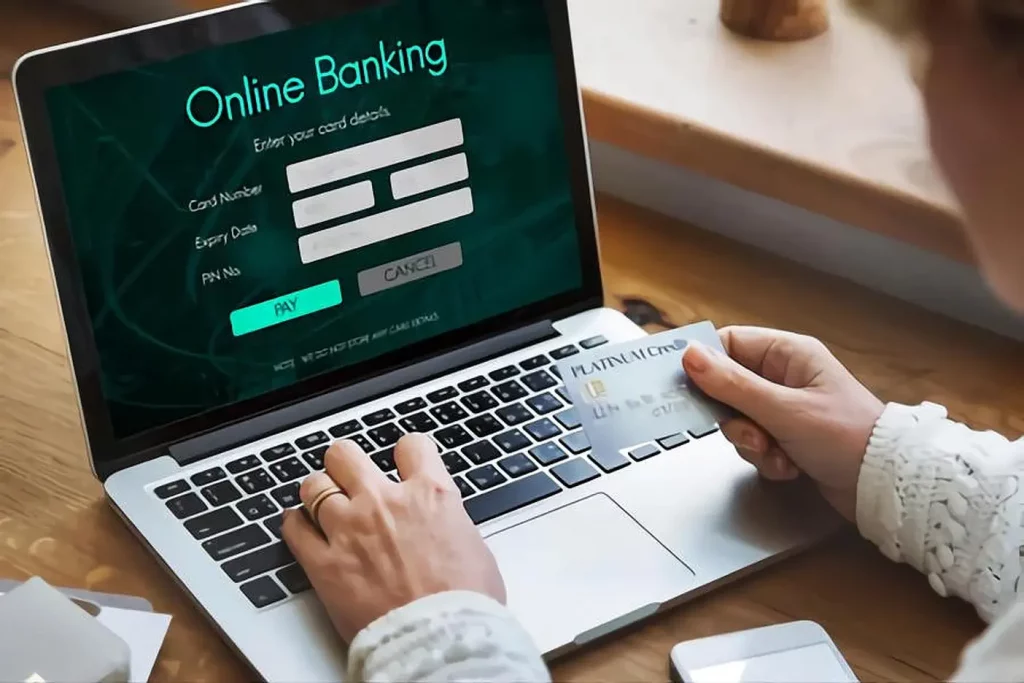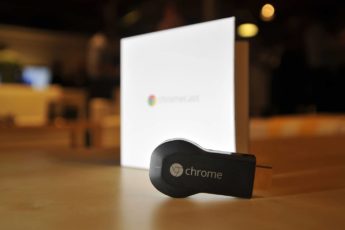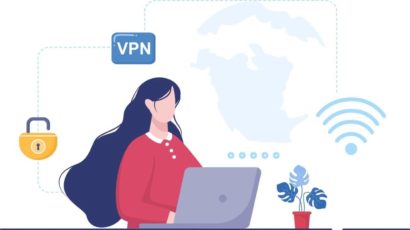Today, everyone has a bank account and a relevant banking branch nearby. Yet, most people try hard to spend as little time at banks as possible because it’s never a great experience. That’s why ATMs appeared first, followed by quick digital banking – thanks to the rapid internet revolution. Nonetheless, this banking evolution brings with it its own security risks, thus triggering the need to use a VPN for online banking.
But what are those risks? Where to find the best banking VPN? If that’s what you are tensed about, don’t worry. This article highlights all those details alongside listing the top banking VPN apps you can use today.
Top 5 internet banking VPNs – Quick list
If you want to ensure your safety and protect your interactions with your bank, you need a VPN service. There’s no way around that. If you are already sold on the idea and more or less conversant with the VPN world, here’s the gist of our findings. However, those readers looking for more in-depth information can find it in the following sections.
Here are the best bank account VPNs.
- ExpressVPN. The most significant reputation in the VPN-verse also delivers the goods for this task.
- NordVPN. A top-notch VPN for almost every task out there is also great for banking.
- Surfshark. A budget-friendly option that will give you almost the same perks like the best VPNs.
- Private Internet Access. A privacy champion with a track record supported by court cases.
- CyberGhost. The friendliest options for VPN rookies.
Why should I use a VPN for online banking?
As the internet took off as a mainstream tool, digital banking also appeared. Then, as smartphones took over the world more recently, digital mobile banking became an essential activity for every bank account holder.
Undoubtedly, banking apps help us manage our money effectively. They let us keep a close eye on our expenses at any time, check our balance, make payments, print receipts, transfer funds to other accounts or banks, and much more that we hardly visit physical banks anymore, fortunately.
But this abundance of practical advantages from mobile banking apps has overshadowed the actual purpose of using a bank — to keep our money safe.
PrivacySavvy has stated countless times that internet security is your responsibility. Neither your government, your ISP nor your bank will accept any liability for any bad things happening to you in the digital realm. Unfortunately, this simple fact is a little harder to grasp for banks because we’ve grown used to seeing how they spend lots of resources on security.
Although, mobile banking moves a lot of the power into your hands. But if you perform personal financial operations online in a public, unprotected WiFi hotspot, you broadcast all your private financial data to the world.
In other words: you put your bank’s efforts to secure digital operations in vain.
Your bank is aware of those risks, so most banks issue one-time passwords, login tokens, and other additional security measures intended to lower the dangers of digital banking.
Nonetheless, it would help if you put in the effort from your end. That’s where you need to use a VPN for online banking. Using one keeps your online activities safe from prying eyes, even if you use a public internet connection, like a hotel WiFi. Also, you can use the same VPN to access your bank account, for example, your Bank of America account abroad without fearing account blocking.
5 best VPNs for banking in 2022 – Detailed list
Now that you know how a VPN protects your digital banking let’s move on to the best VPNs for bank transactions.
But before we advise you on that, let us remind you about some basic security facts.
A VPN is probably the essential tool you can have to secure your digital experience. But it’s not the only thing you need, and it doesn’t do everything. There is no silver bullet in the digital security world. It would be best to have a good antivirus suite and a password manager. Otherwise, the security holes that your VPN fixes still leave other holes around your system that an intruder could exploit to harm you. Digital security is always about the integral approach.
So now, let’s go ahead and talk about the best five VPNs you could consider using to have a safe digital banking life.
1. ExpressVPN

Known for speed and reliability, ExpressVPN is the perfect choice for online banking, online payments, and sharing sensitive data without fearing snoopers.
Pros
- Blazing fast speed
- Unblocks streaming sites and other restricted content
- Tremendous cross-platform compatibility
- Robust security and privacy features
Cons
- Relatively costly
ExpressVPN has a network of fast and reliable servers globally. In addition, it offers state-of-the-art security protocols with military-grade encryption. It also includes additional security features such as a kill switch. Moreover, it’s good enough to support smooth video streaming.
This provider has been playing the VPN game at the highest level for a long time, acquiring the best reputation. As a result, it’s an excellent option regardless of the task you want to protect with your VPN. Fortunately, it seems to be especially well-suited for banking.
ExpressVPN encrypts traffic with the AES-256 algorithm, the industry-standard in VPNs, the intelligence community, the military, and the banking system.
But if the bank’s app already uses AES-256 to protect online interactions, why use a VPN, we hear you ask?
The protection your bank’s app provides starts only after you log into its system. External observers can trace everything you do before and after, thus making you vulnerable to external attacks. On the other hand, if you’re on a VPN, you’re protected all the time, not just when you’re within your bank’s system.
ExpressVPN holds a no-log-keeping policy showing how it cares about your privacy. It means that nothing you do while you’re online through your VPN gets recorded.
The excellent service in ExpressVPN comes at a price. Perhaps this provider’s only drawback is its monthly fee, which is above the market’s average. However, a better service should always cost more. So, this doesn’t have to be a deal-breaker for the most informed potential users. Other options in our list offer services close to ExpressVPNs at lower prices.
2. NordVPN

The number 1 VPN for sensitive online activities. It’s stealth servers, strong privacy, resilient security, and fast-speeds make it the best VPN for online banking.
Pros
- Fast speed servers
- Huge network with multiple locations
- Robust privacy features
- Supports all major desktop, mobile, routers, and other smart devices
Cons
- Detailed settings in the desktop app may be overwhelming
After thorough testing for various tasks, NordVPN appears excellent in every possible way. It secures your banking activities and gives you many extra features to enhance your digital experience.
NordVPN is reliable and secure, and it keeps no logs at all. So it’s an excellent option for banking.
This vendor will also get you CyberSec (an ad blocker preventing malicious code and trackers), DoubleVPN servers (to add extra encryption layers), and Onion over VPN (supports browsing with Tor on your VPN). Moreover, it has DNS leak protection, kill switch, supports smooth video streaming and gaming, and offers a dedicated IP.
Very few products or services live up to their advertising. However, NordVPN does it, and it’s also priced at very reasonable rates.
NordVPN is our preferred VPN for almost any task that comes across us. You can’t go wrong by choosing this VPN, and it will do so much to improve your digital life in other ways that you’ll soon be asking yourself why you did not hire it earlier.
3. Surfshark

A budget-friendly privacy tool to protect your financial details, transactions, and other online activities.
Pros
- User-friendly apps
- Tremendous cross-platform compatibility, including routers
- Supports streaming, torrenting, and gaming alike
- Affordable pricing plans
Cons
- Inconsistent performance with distant servers
Surfshark doesn’t have ExpressVPN’s long history. Instead, it’s a relative newcomer to the VPN world. Still, it’s managed to make a difference in the industry by offering a top-notch service that compares well with Nord or Express but costs a fraction of the price.
It is one of the most versatile VPNs. Surfshark performs regardless of the task you throw at it, and online banking is no exception. Encryption is AES-256; it has a kill switch and fast and reliable connection speeds. Besides the standard VPN requirements, it will also give you several additional features that significantly enhance your digital experience.
Furthermore, it offers a widespread network with more than three thousand servers in sixty different countries. Also, this network allows for an unlimited number of devices to be online concurrently, instead of the usual 5-8 connections that most vendors allow.
Surfshark can obfuscate your traffic to bypass even the tightest censorship measures. And yes, this is one of the few VPNs that work in China, which is no mean feat.
New VPN users often insist on using free VPNs despite their strict security and privacy problems. For them, Surfshark is the vendor that fits into any budget. At less than three USD monthly, there’s no reason for anybody not to have an excellent, safe, and private VPN.
Surfshark is the most cost-effective VPN on our list, but don’t let the low price fool you. It’s as reliable and advanced as the best in the business, and it’s a great choice.
4. Private Internet Access (PIA)

With huge server network, PIA VPN never fails to give you a working IP address to perform online banking just as you did in your home country.
Pros
- One of the largest server network
- Ensures secure browsing
- Compatible with various devices
Cons
- Based in US (a 5-Eyes country)
Private Internet Access (PIA) is a VPN that truly honors its name. Let us explain why.
The notions of security, anonymity, and privacy are intimately related, but they are fundamentally different. Security and anonymity are all about technology. You’re there if you choose the suitable device and software for security and anonymity. It’s automatic, and it works once the technology is set. Privacy is a different thing altogether. It needs technological tools for implementation but, at the core, is a human decision. It’s all about policy.
In VPNs, encryption and IP spoofing will give you security and anonymity. But not privacy. Privacy needs for your provider to be committed to a strict no-logs policy. It means that it doesn’t collect any data on you or any other user in the network. The thing is that a VPN server allows for configurations in which it will collect information on everything you do or one in which it never saves any such data. And that’s the difference.
Every VPN in our list has a no-logs policy, and we’re sure they honor it as far as we can tell. However, PIA has had to face the music. The government requested the company’s logs in two legal trials in 2015 and 2017. PIA delivered nothing. It was not because of any rebellious streak, but because it had no records stored it could give away. And this is how you are sure that your privacy is safe with PIA.
And it has many other advantages besides. For example, PIA’s server network is among the most prominent businesses, with nearly thirty thousand nodes in more than eighty countries.
PIA’s speeds are good, but nothing to write home about. However, this is not a problem for banking because it’s not the type of use case you need to have a lot of bandwidth. Online banking rarely involves downloading files, and when it does, they’re small. The transfers mostly have to do with text, so even a slow connection is good enough for you to have a smooth banking experience.
Additional features include having a dedicated IP (so you will get the same IP address every time you use a given server), an ad-blocker, and excellent apps and clients.
Transparency in PIA is unmatched in the industry. Every app is an open-source project. So, the code is available for anybody to examine and audit, which keeps the VPN’s software current and secure.
5. CyberGhost

This user-friendly VPN works great to unblock streaming, make secure online payments, and spoof IP addresses globally.
Pros
- Good for beginners due to user-friendly apps
- Offers limited free trial
- Affordable cost
Cons
- Speeds not good for gaming
If you don’t know VPN tunneling protocols, don’t understand split tunneling, specialized servers, or don’t care about these details, no worries. You might only want a VPN to install on your device, which works well without your input. Fair enough! CyberGhost is the VPN for you!
CyberGhost is a high-quality VPN service tailored to be a beginner-friendly VPN. The user interface is extraordinary, and the navigation is very intuitive. If so far, this article has persuaded you about the importance of securing your digital banking operations with a VPN, but you don’t want any technical complications, the Romanian CyberGhost VPN is the way to go for you.
The server network is extensive, with thousands of servers in more than 90 countries, standard unbreakable encryption, seven simultaneous connections allowed, and many options for customization for those who want it.
But do not let simplicity deceive you; it is one of the best VPNs in the market. Also, it’s almost as affordable as Surfshark and very advanced and reliable.
If you feel you must choose CyberGhost for usability or any other reason, you won’t go wrong.
How to choose the right VPN for online banking?
The five options described above are hand-picked by our expert staff. However, choosing the right VPN to meet a specific goal is not easy.
First, you need to know what a given task needs in technical terms. Then you need to invest a lot of time, resources, expertise, and energy putting several options to the test to identify those options that will succeed above the rest.
To save you from all the hassle, we have done the work for you. Yet, for transparency, we will tell you here how we picked our top entries.
Everything starts with baseline security. Your digital banking credentials must remain safe at all times. Hence, every VPN in our list has AES 256-bit encryption and the best VPN tunneling protocols (which have been audited) to keep your information secure.
Then we went for additional features. Remember, a VPN is supposed to encrypt your traffic and spoof your IP. So as long as it performs both tasks correctly, it’s a good service.
However, our five picks will give you a lot more features. Most include kill switches, ad blockers, the ability to add extra encryption layers, and more. These features do not protect your information exchanges with your bank directly. Instead, they create a safe environment in your computer or device so that you live within a digital fortress in which indirect attacks can’t succeed against you. In that regard, the extra features are not optional. We want them in our best VPNs because they make everything safer.
Another thing you want is user-friendliness. Dealing with your bank can be already stressful enough. Your VPN should relieve some of that stress instead of adding to it.
Server location is also an important issue. For example, most banks will have a geo-block in place. As a result, only domestic internet users can log into the bank’s system. So the VPN server network must include as many countries as possible so that you will always find an accessible server near you that will allow you to sign in to your bank.
Every entry in our top five VPNs for banking delivers the goods. They meet every requirement, and they do it in style, so you can be sure that all of them will help your banking tasks a great deal.
Free VPNs and online banking: Could I use a free VPN instead?

The short answer is: that you should never use a free VPN. And since banking online involves sensitive information, you should be especially careful to keep away from free VPNs when banking is on your mind.
Free VPNs claim to be as good as their paid premium counterparts. However, there are many problems associated with free VPNs, from lack of functionality to security issues.
Let’s start with the functionality problems. First, free VPNs have server networks with fewer servers. Because the demand for free VPNs is sadly very high, the small network size translates into overworked servers. You may need to wait for several minutes for a successful connection. And once the link is established, you could lose it at any time due to instability. It’s the last thing you want to happen as you complete a sensitive financial operation.
Free VPNs never have the resources you can find in premium VPNs. Bandwidths are low, the data is capped to a daily quota, the servers are too busy, and if you’re not in a privileged area, you could have difficulty finding a server that suits you.
However, you could now tell us that online banking is not a resource-intensive task (like gaming or video streaming), so a VPN could still trick you even with all those limitations. That’s right, but there are other issues at stake, keep reading.
Free VPNs are on business to turn a profit. However, since they get no revenue from your user fees, they get their money by ruining your privacy.
The most frequent business model in free VPNs consists of the VPN using its servers to keep detailed user logs. Then those logs are sold to advertisers and other data miners who know how to squeeze useful information from those logs.
So a free VPN turns your privacy into a commodity they can sell to their commercial partners. While it is disturbing in any scenario, imagine this data on sale to third parties, including your banking credentials and financial activities. It brings “disturbing” to new, higher levels.
So while the technical limitations in free VPNs are maybe not enough reason to keep away from them (as they would be in other tasks such as video streaming), the privacy and security issues in free VPNs should be a huge red flag for you. If your normal digital activities need protection from snoopers, your online banking needs that protection so much more.
In the final analysis, a free VPN could save you the cost of a monthly subscription fee with a premium service. But it could cost you your whole banking account. So free VPNs are not worth the risk, especially when there are premium VPNs that can fit into any budget.
And what else is a VPN going to do for me?
A VPN will do many great things to improve your digital life besides securing your online banking.
VPNs are the swiss army knives of the digital age. They are potent and versatile tools that have many use cases. As a result, they can improve almost any activity you perform online.
So these are some other things that will improve with a VPN besides banking:
- Video streaming. A VPN will allow you to unblock many video streaming services worldwide.
- BitTorrent. If you like the BitTorrent experience, you will be better off hiding your IP address within this or any other P2P network.
- Downloading. Traffic obfuscation and other VPN tools will prevent your ISP from throttling your account. So you will always have 100% of your bandwidth available to do whatever you want.
- Shopping. A VPN allows you to buy your services and products from anywhere. Thus you can choose the lowest prices for the same things and save a lot of money.
Conclusion
Online banking is here to stay. So if you haven’t joined that trend, you will have to, sooner or later.
Mobile digital banking brings a lot of practicality to the table. It will allow you to keep away from brick-and-mortar banks for long periods, always great news. However, it also brings new risks along. You need to be aware of those risks and be ready to fight them because your banking information is too crucial for you to take anything for granted.
Fortunately, you can be proactive about this issue and take an integral digital security approach to your banking activities. That approach includes an excellent antivirus suite, a good password manager, and a premium VPN service.
ExpressVPN is the best banking VPN out there. It offers the best security features and functionality, and it has a cost that’s slightly below the market average.
NordVPN and Surfshark are also very good indeed. Surfshark is so cheap that it can fit into any budget while providing the highest quality service. Then PIA and CyberGhost each have their advantages in terms of privacy and user-friendliness, respectively.
Any of our top five vendors will give you everything you need to ensure your digital banking life is protected.
Banking is important. For centuries, banks have been institutions known because of the high degree of security they deploy to protect the money they keep for their customers. In the digital age, banks can’t do all the work. Some of the safety is in your hands. So it’s up to you to ensure your activities do not conflict with your bank’s efforts to protect you.
FAQs
Yes, it is. Banking is among the safest things you can do on the internet. Banks are traditionally aware of safety issues, and they bring that attitude to their online services. However, no bank can protect you correctly if you don’t meet its efforts halfway. The new realities in the digital world imply that your safety is your responsibility, including in online banking. So yes, online banking is safe in itself, but nothing on the internet is so safe that you can’t ruin it if you adopt the wrong practices.
There is no general answer to this question. Every VPN is different, and many are excellent online banking options. Any of the five VPNs we’ve mentioned in this article will do an excellent job protecting your banking activities.
You need to have an integrated approach to your online safety, which means taking multiple essential measures. Firstly, use a secure password manager. Second, never rely on your browser for that. Third, choose one of the best antivirus suites on the market by paying for the license (Kaspersky is our preferred option. And finally, using a premium VPN service.
Some banks don’t like VPNs for sure. For instance, US-based banks are notorious for this. But this is not the rule everywhere in the world. And a service like ExpressVPN, NordVPN, or Surfshark will successfully bypass a bank’s VPN ban.
You can, but you should never use a free VPN, least of all for online banking. The best VPN services respect your privacy and don’t log your activities. However, free VPNs often do not consider user privacy. Hence, they keep logs and share or sell them to third parties. Thus, using free VPNs for online banking directly threatens your financial privacy.






